Ticket to Lesbos
LESBOS, Greece, April 25, 2016 -- Gotta book a ticket to Lesbos, my bureau chief says it can't wait any longer. It’s April 2015 and a ship carrying 400 migrants from the island of Lesbos had docked the previous day at the port of Piraeus. Something is happening in Lesbos and I have to check it out immediately.
Is it as bad as one of my colleagues already there says it is? He has been closely covering the refugee story for two years and says he’s never seen so many people. “Something is changing on the island, something is changing in Greece,” he tells me. So I go to take a look.
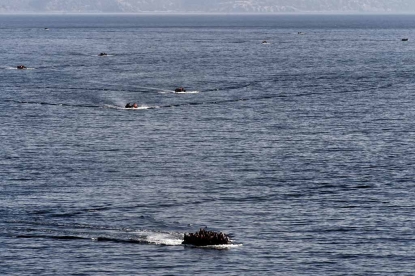 October, 2015. (AFP / Aris Messinis)
October, 2015. (AFP / Aris Messinis)I arrive early in the morning before the sun rises on this beautiful Aegean island. Dozens of people are at the port sleeping, out in the open. A small group of migrants from Afghanistan are brought to the port where the Hellenic Coast guard checks their documents. They are all drenched and they are all shivering. The coast guards give them emergency blankets.
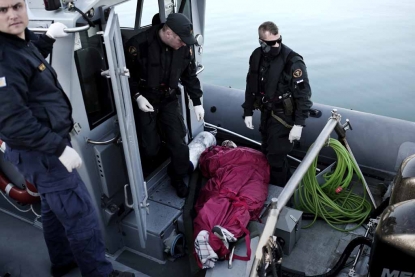 Officers of Hellenic coast guard stand next to a Syrian migrant who was rescued, suffering from hypothermia, off Lesbos shores in April, 2015. (AFP / Angelos Tzortzinis)
Officers of Hellenic coast guard stand next to a Syrian migrant who was rescued, suffering from hypothermia, off Lesbos shores in April, 2015. (AFP / Angelos Tzortzinis)Shivers run down my spine. There are kids among them. I have a six-year-old and a four-year-old at home and I can’t help but think of them when I look at these people with their children. Who are these people anyway? Illegal migrants, irregular migrants or refugees? The people I see are people like you and me. I wonder what will happen in the summer when the weather is better.
Gotta book a ticket to Lesbos, it’s summer and there are dozens of dinghies landing on shore every day, deposing hundreds upon hundreds of people on the island’s northern shores.
NGO volunteers, ordinary citizens and members of the media are the first to welcome them on shore, give a helping hand if needed. Disoriented, they ask in which direction to start walking. Which way is it closer to the city where they will be registered, they ask.It breaks my heart to tell them they have to walk some 60 kilometres to reach the main town of Mytilini.
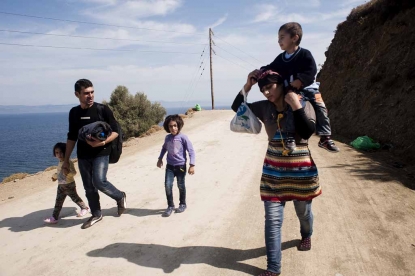 September, 2015. (AFP / Iakovos Hatzistavrou)
September, 2015. (AFP / Iakovos Hatzistavrou)Perhaps, I think, I could help two or three of them. But their wet clothes will leave salt stains on the car seats and I won't be able to explain that to the car rental company. Plus I can get arrested under an old Greek law that forbids helping illegal migrants as you can be charged as a smuggler yourself.
Screw everyone, I'll fill the damn car to the brim. I'll break the Guinness World Book of Records for how many people can fit in a Fiat Panda. How can a child, an old man, a pregnant woman walk this distance? I end up stuffing eight people in.
Gotta book a ticket to Lesbos, it’s October 1 and today they will bury four migrants who drowned while trying to reach the island.
Wrapped in white sheets the bodies of four people lie on the cold dirt of a cemetery in the town of Mytilini. We don’t know who they are, their names, where they came from. Among them is a girl who the coroner says is seven years old.
Seeing her body wrapped up in white on that chilly afternoon sends chills down my spine. There is not enough space in the cemetery so the bulldozer digs only three holes. How cruel.
I wonder where her Mommy is? I can’t believe that I’m thinking this, but I hope she drowned too. The thought of her mother still alive and searching for her little angel in Turkey or Greece while the girl is laid to rest in a grave next to a complete stranger is something completely beyond me.
Gotta book a ticket to Lesbos, it’s October 6 and the Greek prime minister will visit the island for the first time.
It’s a cold visit. He goes to some camps on the island, which were prepared ahead of time. That’s not where the drama is. The drama is on the northern beaches of Lesbos, where the refugees are landing.
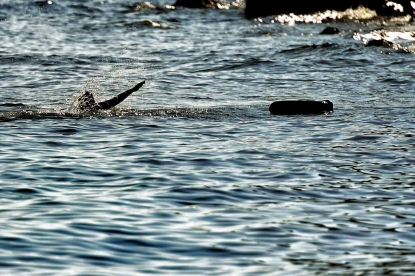 October, 2015. (AFP / Aris Messinis)
October, 2015. (AFP / Aris Messinis)Why are they only showing him the camp where everything is organised and spotless clean? I am so disappointed, he is not going to see anything.
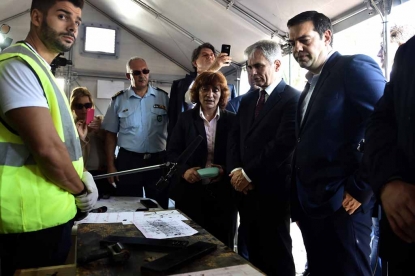 Austrian Chancellor Werner Faymann (2nd R) and Greek Prime Minister Alexis Tsipras (R) visit a refugee and migrant registration camp on Lesbos. October, 2015. (AFP / Aris Messinis)
Austrian Chancellor Werner Faymann (2nd R) and Greek Prime Minister Alexis Tsipras (R) visit a refugee and migrant registration camp on Lesbos. October, 2015. (AFP / Aris Messinis)
Gotta book a ticket to Lesbos, it’s the last days of October, the weather has deteriorated and I fear the worst.
One! Two! Three! Four! Five!... Twenty-eight! Twenty-nine! Thirty!... Two breaths. Come on, snap out of it, don’t just die in front of my lens. There is a real doctor giving you CPR, everything is going to be alright.
Everything has to be alright. He doesn’t seem older than 20, a young man with his entire life in front of him. But why is the doctor giving up, has he done everything humanly possible? Why is the doctor walking away? WTF just happened? It seems so surreal. But I can't dwell on my thoughts for too long, I now have to edit the video, relive everything again and send it to my editors at headquarters.
Once the footage is out, I am furious -- the editors cut all of the images of the CPR, deeming they were too harsh for our clients. I tried my best to shoot either from a distance or a super close-up, so that facial characteristics wouldn’t be recognised. I would never want some mother to see her son in this state on the screen, I would never forgive myself.
But too harsh? My ass. We’re journalists, our job is to show what happens and this is what really happens on Lesbos. Not just today. Every day. Why shouldn't the world see this?
Yes, I want to shock you, but only to make you understand what is happening here. Something sinister. Something horrible. Maybe if you’re shocked, maybe then it will stop happening.
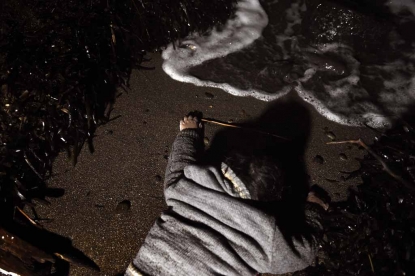 November, 2015. (AFP / Aris Messinis)
November, 2015. (AFP / Aris Messinis)I am so angry. I am still so angry still the following day that I have to take a walk on the beach to try and sort it out. I look around as I walk and can only imagine last summer, when this was a picture-perfect postcard beach in the Mediterranean. But now hundreds of lifejackets litter it.
Something catches my eye. What is that? Could it be a body? I walk closer. It is. And a little further, there is another. A boy. He can’t be older than eight. I stop in my tracks. It’s the first time that I actually see a dead body on the beach. There is noone around. Such a small body. I walk around it. I think of my kids. A little further, I see a body of an old man.
Some colleagues show up. Where are the authorities? We can’t just leave them lying on the beach.
We go up to the road. An undertaker is there and he volunteers to take the bodies. But he can’t possibly carry all of these bodies himself. He’s one guy with a red van. We reporters end up carrying the bodies to him on the road.
I am devastated. This is a beach on an island in a country that’s not at war. This should not be happening. It’s sinister. It’s evil. Why would this happen? Why would this happen to a small boy?
Days later, I watch the CPR footage again. The editors were right. They were too harsh to be shown to clients. Way beyond harsh.
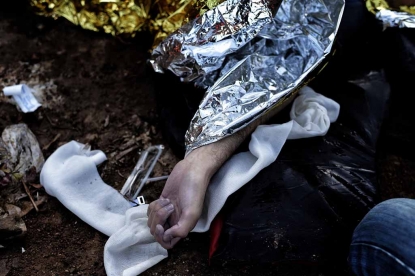 The hand of the man who didn't make it, despite the CPR. October, 2015, (AFP / Aris Messinis)
The hand of the man who didn't make it, despite the CPR. October, 2015, (AFP / Aris Messinis)Gotta book a ticket to Lesbos, it’s early April 2016 and the first deportations of the refugees back to Turkey are to begin.
This refugee crisis is the biggest Europe has faced since the end of World War II and the deportations were part of a hugely controversial deal between the EU and Turkey. Under the deal, Turkey agreed to take back all irregular migrants that had landed in Greece after March 20. In return, the EU pledged to rehouse one Syrian inside the bloc for every one deported from Greece.
The grim-faced group we saw were men without children, without wives. The media descended on the place, it was a well-planned operation. Noone was screaming. In a way, these were people who have had enough, who wanted to leave.
For me it was coming full circle. I’ve seen them come, now I’m seeing them go and everything in between was pretty crap.
It is a weird feeling seeing them on a boat. A decent boat, unlike the rickety dinghies they came to the island on. You think of all those who have died -- 366 people this year alone. You think of the unfairness. Many of these people spent their entire life savings, they came here with such hope, such dreams. I wish something more could have been done, I wish they could have a better future.
The thing about this story is that it gets you to question yourself. I was and am very pro-European. But this is not a Europe that I want. This is not a Europe of solidarity. That eight-year-old boy whose body I saw on the beach. He was an eight-year-old boy. Period. He’s not evil. He’s not going to harm me. He should not be lying dead on a beach.
Gotta book a ticket to Lesbos, it’s mid-April 2016 and the pope is due to visit.
Hope fills the island ahead of the visit. Refugees and Lesbos residents alike seem so excited. With his visit, the attention will again be on Lesbos, they say, maybe the borders will reopen.
The pope seems very kind and genuine but I don’t share their excitement. I am very sceptical.
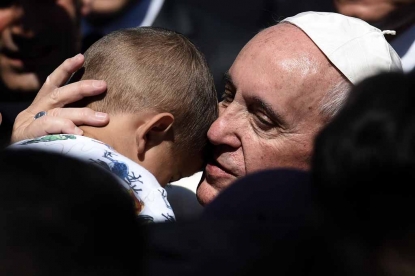 Pope Francis hugs a child at a detention center on Lesbos. April, 2016.
(AFP / Aris Messinis)
Pope Francis hugs a child at a detention center on Lesbos. April, 2016.
(AFP / Aris Messinis)Gotta book a ticket to Lesbos….
From April 2015 to April 2016, I’ve been on assignment to Lesbos 13 times. That’s not counting the myriad of other islands and places from where I have covered the refugee story.
This story seeps into your bones. I keep telling myself that I have to be a professional. I have to try and keep everything at a distance so that I can tell the story in a balanced way. But it’s hard to remain at a distance when you see a dead child on the beach. It really is.
When you see the refugee children, you see your children in their eyes. You can’t get around that.
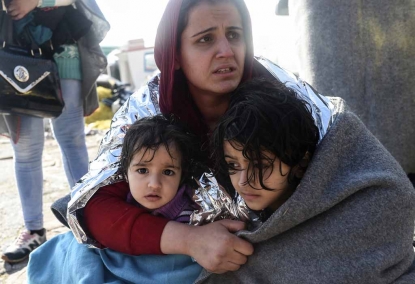 November, 2015. (AFP / Bulent Kilic)
November, 2015. (AFP / Bulent Kilic)And you can’t help but get involved. One time I saw a little boy come out of the boat and he was freezing, he was barefoot. I gave him my socks.
Another time I was in a refugee camp talking with a couple that I befriended and the woman said she was dying for a pizza. So we hopped into my car and drove to town and had pizza for lunch.
I think of Behnam, Reshan, Media, Noura, Wissam and dozens more people from whom I did not keep my distance. I would have never been able to tell their stories if I had kept my distance from them. And their stories needed to be told.
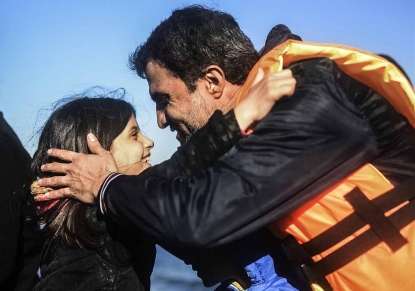 November, 2015. (AFP / Bulent Kilic)
November, 2015. (AFP / Bulent Kilic)I get three-four What’s App messages a day from various people whom I’ve come across. I keep in touch with them on Facebook.
And then there are the images, the sounds that I know will stay with me for a long time. The sound of the doctor counting during the CPR. Watching refugees swimming in the open water after their boat sank. Seeing that girl without a name being buried in a grave with a total stranger.
This story changes you, too. I definitely hug my kids more. Once I brought my wife and kids to a camp and they spent a bit of time walking around. I wanted my wife to see what I see every day. And I wanted my kids to see that there are other kids in this world who don’t have much in this world. I think it’ll be good for them.
Gotta book a ticket to Lesbos -- it’s the day this blog is published and Jordan’s Queen Rania is due to come to the island….
This blog was written with Yana Dlugy in Paris.
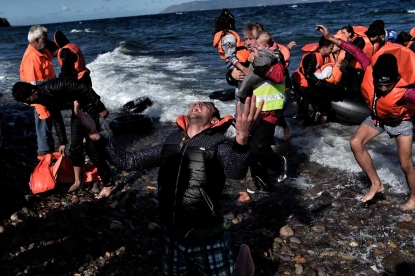 October, 2015. (AFP / Aris Messinis)
October, 2015. (AFP / Aris Messinis)





